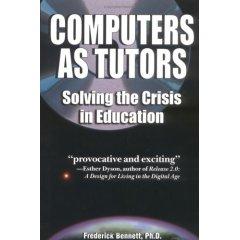| 2020ok Directory of FREE Online Books and FREE eBooks |
Free eBooks > Nonfiction > Education > General > Computers as Tutors: Solving the Crisis in Education
Computers as Tutors: Solving the Crisis in Educationby Frederick Bennett  Download Book (Respecting the intellectual property of others is utmost important to us, we make every effort to make sure we only link to legitimate sites, such as those sites owned by authors and publishers. If you have any questions about these links, please contact us.) link 1 About Book Midwest Book Review, July 1999 In Computers As Tutors: Solving The Crisis In Education, Frederick Bennett lays out the difficulties that are present in contemporary American education and reveals why the millions of newly added computers in schools have been largely ineffectual. Bennett describes how computers, if used differently, will enable every student without exception to succeed in school. The key is individualized instruction. A private tutor in the form of a computer will allow each pupil to learn at his or her own comfort rate. The benefits will be manifested in the lives of slower studies, brighter students, handicapped students, and all students, preschool through university. Teachers will remain and provide the human element to ensure that education develop the whole person (not just the intellectual side), and freed of traditional time-consuming clerical duties, "Leader Teachers" will be able to mentor and monitor children as they progress with computerized tutorial instruction. Computers As Tutors is innovative, challenging, at times provocative -- and always, highly recommended reading for aspiring and practicing educators at ever grade level. Fall/Winter 99 Issue of Reviews from Parent Council Computers as Tutors: Solving the Crisis in Education Selected as "Outstanding" by Parent Council Frederick Bennett methodically and logically analyzes current educational Practices with a focus on the enhanced role computers can play in the schools. His review of past educational theory and present-day situations illustrate the frustration o many with our schools. Bennett's vision for education will not be easy to achieve, but this information is well worth the time that parents, taxpayers, school board members, educators, and politicians, and other stakeholders would spend reading this book. An innovation that actually could revolutionize our schools is shaped here.
It is no secret that monumental problems exist in our schools. Reading, math and science skills are sadly deficient, and students in record numbers are dropping out in frustration over what they perceive as their lack of ability to learn. Teachers are over-burdened with tedious tasks, unable because of hours available, requirements of curriculum, and over-crowded classrooms, to devote quality time to those most in need of instruction. The solution to this self-defeating dilemma is one-on-one computerized education, writes Dr. Bennett who advocates pairing students with computers for individualized instruction. With computers as tutors, each child, regardless of his or her intelligence level or background, will be able to succeed in school at their own personal pace. Infinitely patient, non-judgmental, a computer tutor will repeat the lesson until it is learned. Each small achievement will feed the human need to succeed. What about traditional teachers --- will they become obsolete, question those who fear computerized education will conceive an unfeeling class of humanoids. Such is not the case. Teachers will continue to educate and facilitate, providing the human element to ensure education develops the whole person, not just the intellectual side. They would evolve into "Leader Teachers" with more time and energy to mentor and monitor pupils as they progress. Increased direction by teachers in smaller neighborhood schools (instead of larger learning institutions where at-risk students are often ignored) would have a better chance of targeting troubled teens before they were able to mastermind a tragedy like Littleton.
Idealism then got the better of him and he decided to try to change the world. The way he chose was to enter the Roman Catholic priesthood. It was back to school again and he received an STL (Licentiate in Sacred Theology) from the Pontifical University Angelicum in Rome, Italy. Returning to the U.S. he taught Greek and performed ministerial functions. He went back to school again and received MA in Counseling at University of New Mexico, and then a Ph.D. in Psychology from University of Utah in 1971. After the advanced degrees, he helped set up a treatment program for clergy with alcoholism and also worked in an inner city mental health center. It was there that he first confronted the reality that some people without education could not get jobs, regardless of how much they wanted to work. Eventually, he realized he was not changing the world and left the priesthood. He directed public addiction treatment programs in Colorado and Florida and married a Ph.D. chemist who was an excellent teacher. Thereafter, he established, owned and directed a group of private addiction treatment centers. He also became interested in computers and began to write programs to handle the paperwork for his company. In 1990 he sold the business, moved to Sarasota, Florida, and began new projects. One was writing a computer program for artists, which he markets throughout the United States. He also started to think seriously about the problems in education and spent several years studying the subject. His wife's background as a teacher was of immense help. Finally, he sought to bring together what he had acquired from his studying and education, from his experience working with people at all levels, and from his knowledge of computers. The result is the book, Computers as Tutors: Solving the Crisis in Education. Related Free eBooks
| Related Tags |












SEND A COMMENT
PLEASE READ: All comments must be approved before appearing in the thread; time and space constraints prevent all comments from appearing. We will only approve comments that are directly related to the article, use appropriate language and are not attacking the comments of others.